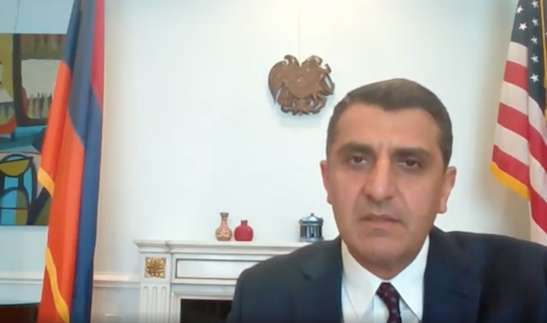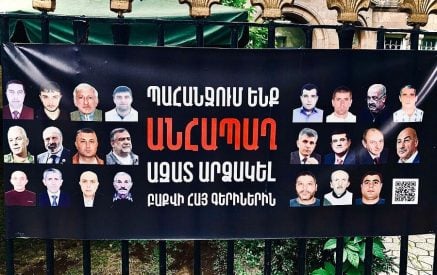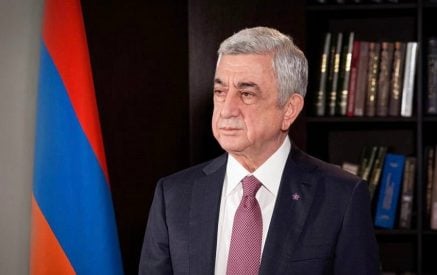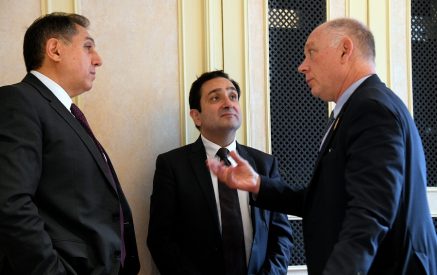ASBAREZ.COM
Since the July attacks on Armenia by Azerbaijani forces, the entire balance of the peace process has been impacted and Baku, as well as Ankara, have started a diplomatic public relations campaign to discredit Armenia. To talk about these and other issues, Asbarez Editor Ara Khachatourian on Monday interviewed Armenia’s Ambassador to the U.S. Varuzhan Nersesyan via Zoom.
Read also
ARA KHACHATOURIAN: Let’s begin with the July attacks. How has that changed the course of at least the peace process, as we’ve known?
AMBASSADOR VARUZHAN NERSESYAN: Thank you Ara. And thanks to Asbarez for this interview. Of course, this is timely and the issue of the July attacks on Armenia by Azerbaijan remains acute. As you know, in July, we had yet another attempt by Azerbaijan and yet another aggression, this time on the internationally recognized border of the Republic of Armenia.
This was not a coincidence. This happened along with Azerbaijan’s longstanding policy of aggression, attacks and threats toward the Republic of Armenia and Nagorno Karabakh. Of course the attacks have impacted the stability of the region.
Azerbaijan has not made it a secret that it has the intention to militarily resolve this conflict. So all the claims of Azerbaijan’s accusations against Armenia,are absolutely baseless. Armenia did not and does not have any intentions to militarily resolve this conflict. What Armenia intends is to decisively defend itself from possible aggression from Azerbaijan or from anyone else.
Thanks to the mediation of the co-chairs it’s been possible now to achieve a ceasefire and for us, there is no alternative to a peaceful settlement. We are looking forward to the resumption of negotiations in good faith and based on mutual compromises. What Azerbaijan expects from these negotiations is a unilateral compromise, and a settlement that satisfies only the Azerbaijani side. It’s impossible. Any settlement is going to be based on the mutual compromise between, first of all, Azerbaijan and Nagorno-Karabakh. The Republic of Armenia, , as a guarantor of the Nagorno-Karabakh’s security stands ready to negotiate in good faith toward the peaceful resolution of the Nagorno-Karabakh conflict. We’re looking forward for the co-chairs to resume the negotiations and to continue the peace process because any negotiation is much better than any confrontation or military conflict.
A.K.: We saw that the Armenian armed forces were swift in their response to the attacks and we saw new heroes that have emerged from that. How have the July attacks affected the regional stability in in that entire Caucasus region?
V.N.: Of course, the July attacks had an impact on our regional security. We saw that the international community had a prompt reaction by calling upon the parties toward restraint and return to the negotiating table.
It was only one country that played a destabilizing role, namely Turkey, which openly and consistently spoke in favor of Azerbaijan’s attack and spoke of encouraging Azerbaijan to continue its provocations, unilaterally supporting Azerbaijan’s positions. So the regional impact, I think it’s been more or less balanced by most of the countries. it was Turkey that has played a destructive role not only in other regions such as Mediterranean, Syria, but also with its intentions in the South Caucasus. Also, as we saw later on, Turkey and Azerbaijan held large scale military exercises with concrete scenarios, which also demonstrated the intentions we these two countries.
Also there have been some reports about Turkey proposing to establish a military base in Azerbaijan. At this stage, Turkey has already deployed certain types of its military aircraft to Azerbaijan and conducts very hazardous activities with that. Also, there are confirmed reports that Turkey and Azerbaijan, are working intensively to recruit terrorists from some Middle Eastern countries and Central Asian countries and to send them to Azerbaijan to fight in the possible next phases of the escalation. Turkey and Azerbaijan have openly declared that they are going to continue this provocation.
And I think the international community has a say here to call upon and to take certain actions against Turkish and Azerbaijani attempts to destabilize because any attempt to resolve this conflict militarily may create enormous problems not only in the South Caucasus, but around the globe. Therefore, Armenia and likeminded countries see no alternative to the peaceful resolution of the conflict on the basis, as I said, of mutual compromises. Thank you.
A.K.: Not even a week before the July 12 attacks, the Azerbaijani President Ilham Aliyev announced that the efforts of the OSCE Minsk Group co-chairs are futile and essentially challenged the basis of the peaceful negotiations by saying “who said that we can’t use military force.” And then, of course, not even a week later, the attacks happened. Where does that put Azerbaijan when we’re talking about a peaceful settlement of the Karabakh conflict and also the region itself?
V.N.: Absolutely, you’re right. A week before the July aggression toward Armenia, Azerbaijan’s president made such declarations and this is not a coincidence. During that same interview, if I’m not mistaken, the Azerbaijani president once again reiterated his threats to resolve this conflict militarily. So if you negotiate a peace deal through the mediation of the of the OSCE Minsk Group, you cannot simultaneously undermine the very institution that is dealing with the peaceful settlement. The fact that the conflict is not settled so far is not because of the OSCE Minsk Group. It is because Azerbaijan is avoiding to address the root cause of this conflict—it is avoiding the fundamental issue of the self-determination of the people of Artsakh. The longer Azerbaijan avoids this issue, the more serious this issue is going to become and it is not going to be resolved. So the mediators, have done their part. But it is Azerbaijan that avoids the peaceful settlement. It is Azerbaijan that refuses to resolve this issue on the basis of the mutual compromises. Azerbaijan wants to resolve this issue on the basis of its own wishful thinking.
This is not going to be resolved on the basis of such approaches. That’s why complaining about the activities of the co-chairs is completely baseless. It is not that we’re perfectly happy with the activities of the co-chairs. Of course we are not. The proposals that have been put on the table are not our dream scenarios, but we do not complain about the activities of the co-chairs because we do not have illusions that the co-chairs are going to invent or to create a magic scenario. No settlement is going to be perfectly satisfactory for either of the three parties to the conflict. So we have to accommodate, more or less, the needs of each other. But we cannot expect one side to capitulate and the other side to accept 100 percent of whatever we want. The conflict should be resolved in good faith. We do not consider the people of Azerbaijan our enemies, even though the Azerbaijani president declares that the Armenian people are the enemies of the Azerbaijani people.
We want to live side by side and co-exist with the neighboring country. But it takes two to tango. One cannot resolve this conflict only on the basis of one or two approaches. That’s why these complaints about the role of the OSCE Minsk Group are unnecessary.
One should look at its own position in a self-examinatory manner and address the fundamental questions on the negotiating table. So for already 25,26 years Azerbaijan wants to avoid the reality, but there is an existing reality.
The people of Artsakh live there on their ancestral land and they are going to exercise their right to self-determination. And I am sure in the context of the settlement of this conflict, the issue of self-determination is going to be addressed as it is already enshrined in the fundamental documents, the basic principles and many other documents laid down on the level of the presidents of the co-chairs—The Minsk Group countries.
A.K.: We can’t talk about the July events and not address the fact that while the military aggression was going on and a week later, Aliyev changed his foreign minister. How do you think this change is going to impact the future of the talks?
V.N.: We haven’t seen yet the new foreign minister’s positions in the negotiating process, we have seen some interviews by him. But basically with a personality change, I can’t say what will be the impact? Obviously, the Azerbaijani president, most likely, was not satisfied with the activities of his former foreign minister. However, what is important here from the perspective of the peace process is that the new minister does not come with unrealistic expectations to the negotiating table. In this sense, I don’t expect that the change of the minister is going to play a major role, because both the previous and current ministers represent the position of the president of Azerbaijan. So we expect that on a highest level, Azerbaijan should finally starts to grasp the reality on the ground and to come to terms with it and to negotiate in good faith.
A.K.: Since the July events, both Azerbaijan as well as Turkey have continued their PR campaign against Armenia. But this time around, one of the talking points seems to that there is a Russia Armenia nexus and are blaming Russia for supplying arms to Armenia and linking the clashes to that. What do you say to that?
V.N.: Yes, I am familiar with the accusations by the Azerbaijani side, and I should say, it really causes a smile about the Russian supplies to Armenia. First of all, the Russian Ministry of Defense has provided some comments in regard to Azerbaijani allegations. However, I just had a broader comment on this issue before. Before Azerbaijan expresses these fake allegations and concerns about the arms supplies to Armenia it should address its own arms purchases. Azerbaijan has been bragging that its budget is several times higher than the entire state budget of the Republic of Armenia. Azerbaijan has been bragging that it has bought billions and billions of dollars of military equipment from the Russian Federation, from Israel, from Pakistan, from Turkey, from many Eastern European countries. So with this enormous accumulation of combat military equipment, now Azerbaijan, all of a sudden, when it sees that it did not manage to advance neither during the April war of 2016 nor during the July clashes it is complaining that Armenia has a strong defense. All of a sudden, Azerbaijan wants Armenia to stay defenseless. I can promise that Armenia will never stay defenseless because the government of Armenia and the people of Armenia have done everything to defend themselves from Azerbaijan.
Whatever military procurement Armenia has, it has a defense purpose. It does not have any intention to be use [the weapons] against a third party if Armenia’s security is not threatened. So Azerbaijan can relax because Armenia does not have any intentions to use these weapons unless Armenia is attacked. Therefore, this is a completely baseless accusation about Russia supplying weapons to Armenia in the aftermath of July attacks.
And we have seen, just on the contrary, that Turkey has—and this is public—been selling or providing Azerbaijan combat drones, several dangerous types of drones that Turkey produces, as well as Turkish combat military jets of American production F-16 are already deployed in Azerbaijan.
So before Azerbaijan jumps to express concerns about Russia or any other country supplying weapons to Armenia, it should, first of all, stop the arms race that it has instigated. By the way, when Azerbaijan complained to one country in Europe about why that particular country is selling arms to Armenia, that country, on the highest levels, provided clarification that it sold ten times more equipment to Azerbaijan rather than to Armenia. So here is the conclusion that Azerbaijan cannot and should not complain about Armenia purchasing certain types of military equipment because it is for one purpose: to defend Armenia from Azerbaijan’s aggressions and provocations.
A.K.: As you saw and as has been the case, any time there is an attack on Armenia or Artsakh, the entire Diaspora stands up in solidarity. What is your message to the Armenian American community, which not only expressed its anger and frustration on Azerbaijan, but also began in various communities to fundraise for the areas that were impacted? What is your message to the Armenian Americans?
V.N.: Of course, my first message is my sincere gratitude to the Armenian American community. Whenever there is a problem, whenever there is an attack on Armenia or whenever there is any natural or manmade disaster, the Armenian American community stands at the forefront to help the homeland, like in all the previous times, beginning from the devastating earthquake of 1988. Since independence, Armenia has faced many challenges and always the Armenian American community has been standing behind Armenia with its strong support financially, politically and by all means.
We have received many, many calls from our community, by the organizations, by the parties, by individuals expressing their support and concern, of course, about the situation that was evolving in July. And we very much appreciate that several fundraising efforts have taken place by certain individuals and organizations aimed at Tavush region’s development. I think it’s very appropriate that the community in this kind of situations, of course, helps those affected areas because many civilian infrastructures were severely damaged after the Azerbaijani attacks. The government of Armenia has all the means to restore the infrastructures. But, as I said in one of my interviews, it is very important that the community and not only the Armenian American community, but other Armenian Diaspora communities invest in those areas of the border regions of Armenia and create opportunities for our compatriots there, because these are heroic people. The people of Tavush, the people of Syunik and other border regions of Armenia.
These people deserve much better opportunities. Our government does its best to create regional development plans and infrastructure development. Of course, it will be much more efficient if the Diaspora invests there, especially now that Armenia has a much better investment environment.
Of course, Covid played a negative role for Armenia’s economy in the beginning of the year. The projected economic growth by World Bank and IMF was about 9.5 percent for 2020 for Armenia prior to the pandemic. Armenia and the government are doing their best for the soonest recovery of the economy. So the main direction and the message, of course, for the community is to come to Armenia, especially now that flights are already resuming. Many Diaspora Armenians, unfortunately, canceled their flights. But I hope now with this incremental opening, first of all, our compatriots will start to resume their trips to Armenia, resume their business trips to our nation and their plans with Armenia because Armenia has a great future, but has a much better future with the engagement of our communities and our Armenian American brothers and sisters.
A.K.: And of course, we will also continue to urge our elected officials to address these concerns about Azerbaijan’s aggression and also make sure that they are legislated somehow so there is some kind of an action required by the US administration. Thank you very much for spending this time with us, and we’re all here in the same fight together and whatever challenges facing Armenia, we will deal with it together. Thank you.
V.N.: And I thank you Ara. And I wish you and your editorial team all of the best.
Caption: Armenia’s Ambassador to the United States Varuzhan Nersesyan























































